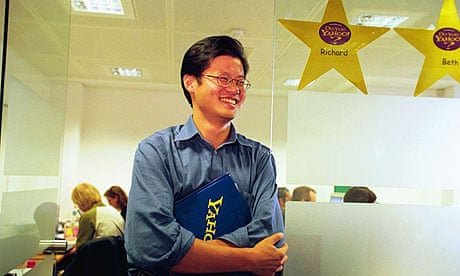Yahoo has been forced to admit shareholder opposition to CEO Jerry Yang's re-election to the board of directors last week was much stronger than it first reported.
The company blames a vote counting error by a third party company for under-reporting the opposition to Yang and chairman Roy Bostock, both of whom received about twice as many negative votes than the numbers announced on Friday after the Yahoo annual meeting.
Broadridge Financial Solutions, the company that counted shareholder votes, has admitted it made a mistake. Instead of 14.6% withholding their votes in Yang's reelection to the board, the real amount was 33.7%.
The percentage of shares withheld for Bostock almost doubled to 39.6% from 20.5%.
The errors – blamed on "a truncation error [that] occurred in reporting share numbers that exceeded eight digits" – did not affect the outcome of the election but they justified the request by Yahoo's largest shareholder, Capital Research Global Investors, for a recount after it suspected its decision to withhold support for Yang was not reflected in the results.
Capital and others withheld their votes in protest at how the board handled takeover negotiations with Microsoft, which wanted to buy the company in a deal worth about $42bn (£21.5bn).
Yahoo finally withdrew from negotiations in June.
On Friday, the dissidents won concessions. Carl Ichan, a corporate raider and proponent of the takeover, was elected to the board as part of a previously agreed truce between him and the company. He also will be able to recommend two additional members.
Icahn saw his election to the board as a compromise as he realised he could not win a proxy fight to remove the whole board. If Microsoft – or another potential buyer - returns to the negotiating table, Icahn will be in a stronger position to influence the outcome.
As Icahn noted on his blog: "The board has agreed in the settlement agreement that any meaningful transaction, including the strategy in dealing with that transaction, will be fully discussed with the entire board before any final decision is made."
Although the voting error did not change the results, experts are hinting that Bostock may be forced to step down as support for him is particularly weak.
He received a smaller percentage of votes than former CEO Terry Semel did last year. Semel resigned from his position six days later and stepped down from the company's board in January.
The news of the voting glitch was announced after the markets closed on Tuesday. When trading began Wednesday morning, the company's share price dropped a fraction to about $19.70, which is about $1 above their 52-week low.
They traded as high as $34.08 earlier this year, after Microsoft went public with its takeover plans.
